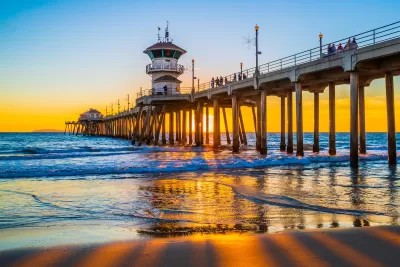California’s aging piers face growing threats from climate change, with intensifying storms, rising repair costs, and structural vulnerabilities forcing tough decisions about their future preservation.

California’s iconic piers, symbols of coastal culture and history, are increasingly imperiled by climate change. As reported by Noah Haggerty, recent storms, including those that severely damaged Santa Cruz Wharf and Ocean Beach Pier, have highlighted the vulnerabilities of these aging structures to intensifying storm patterns, rising sea levels, and unpredictable weather events. Despite ongoing efforts to reinforce piers with structural upgrades, the challenges of climate change are outpacing these interventions. Scientists warn that shifts in storm direction, fueled by warming temperatures, are striking even sheltered piers, creating an urgent need for strategic planning and resource allocation to preserve these landmarks.
The costs of maintaining and upgrading piers are steep, with repairs often running into millions of dollars and leaving piers closed for years. Santa Cruz Wharf, for example, faced delays due to lawsuits over environmental impact reports, while interim repairs began too late to prevent further damage from extreme storms. Similarly, San Diego’s Ocean Beach Pier has been deemed irreparable, necessitating an $8 million replacement project. Many other piers, such as the Ventura Pier, have required substantial restoration following storm-induced damage, and some, like Seacliff State Beach Pier, have been removed entirely after severe deterioration.
California’s coastal piers are at a crossroads. Most were built over a century ago, originally designed for calmer seas and different purposes. While they now serve as cultural and recreational hubs, the question of their future looms large. With limited resources, officials must make tough decisions about which piers to protect and how to adapt to the changing climate. As Patrick Barnard of the U.S. Geological Survey notes, strategic prioritization will be key as the state grapples with the growing impacts of climate change on its historic coastal infrastructure.
FULL STORY: California’s piers may not be able to withstand climate change

Planetizen Federal Action Tracker
A weekly monitor of how Trump’s orders and actions are impacting planners and planning in America.

Maui's Vacation Rental Debate Turns Ugly
Verbal attacks, misinformation campaigns and fistfights plague a high-stakes debate to convert thousands of vacation rentals into long-term housing.

San Francisco Suspends Traffic Calming Amidst Record Deaths
Citing “a challenging fiscal landscape,” the city will cease the program on the heels of 42 traffic deaths, including 24 pedestrians.

Defunct Pittsburgh Power Plant to Become Residential Tower
A decommissioned steam heat plant will be redeveloped into almost 100 affordable housing units.

Trump Prompts Restructuring of Transportation Research Board in “Unprecedented Overreach”
The TRB has eliminated more than half of its committees including those focused on climate, equity, and cities.

Amtrak Rolls Out New Orleans to Alabama “Mardi Gras” Train
The new service will operate morning and evening departures between Mobile and New Orleans.
Urban Design for Planners 1: Software Tools
This six-course series explores essential urban design concepts using open source software and equips planners with the tools they need to participate fully in the urban design process.
Planning for Universal Design
Learn the tools for implementing Universal Design in planning regulations.
Heyer Gruel & Associates PA
JM Goldson LLC
Custer County Colorado
City of Camden Redevelopment Agency
City of Astoria
Transportation Research & Education Center (TREC) at Portland State University
Jefferson Parish Government
Camden Redevelopment Agency
City of Claremont





























